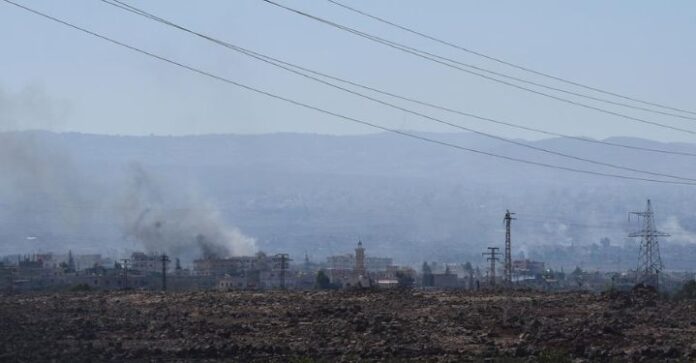In a dramatic escalation of regional tensions, Israel carried out a series of airstrikes early Tuesday targeting Syria’s military headquarters in Damascus, following days of intense sectarian violence in southern Syria’s Sweida province, home to the country’s Druze minority. The strikes mark one of Israel’s boldest military responses since the fall of the Assad regime in late 2024.
Sectarian Violence Triggers International Concern
The chain of events began with an outbreak of violence in Sweida, a city dominated by Syria’s Druze community. The conflict was sparked by the abduction of a Druze merchant by rival Bedouin fighters, leading to retaliatory attacks. The situation escalated when Syrian army units intervened—not to de-escalate, but allegedly to support one side.
According to reports by the Syrian Observatory for Human Rights and international media, over 240 people have been killed since July 12, including at least 28 Druze civilians—some reportedly executed after summary trials by army personnel. Footage circulating on social media shows what appears to be soldiers in Syrian army uniforms shooting unarmed civilians in Sweida city’s southern quarter.
These developments triggered widespread outrage among Druze leaders in Syria and abroad, including in Israel, where the Druze are a key part of the military and political fabric.
Israel’s Warning and Rapid Response
Israeli Defense Minister Israel Katz issued a stern warning to Damascus earlier this week, urging the government to withdraw its forces from Sweida and halt actions targeting the Druze. “Israel will not allow another genocide under its watch,” Katz said in a press conference Monday.
Hours later, Israeli jets launched a series of precision airstrikes targeting Syrian military assets. Initial strikes hit al-Tha’lah airbase, a facility used by pro-regime militias, followed by direct hits on the Syrian military’s General Staff building in central Damascus. Satellite imagery and local witness accounts confirmed visible damage to the entrance and later to the building’s upper floors.
The Syrian government, now under a transitional council dominated by Islamist factions and backed by Iran, condemned the attacks and claimed that two civilians were injured. Damascus labeled the Israeli actions “a violation of Syrian sovereignty and an act of war.”
The Druze: A Minority Under Siege
The Druze community has long walked a tightrope in Syrian politics. Historically loyal to the Assad regime, many Druze shifted to neutrality during the civil war. With the Assad regime deposed, the power vacuum has left minorities like the Druze vulnerable to attack from both Islamist factions and rival tribal groups.
In Sweida, local Druze defense groups, known as the “Sheikhs of Dignity,” have taken up arms to protect their communities. These groups, though under-equipped, reportedly held off Syrian army units for several days before the IDF intervention shifted the dynamics on the ground.
Israeli Druze leaders welcomed the strikes. Sheikh Mowafaq Tarif, spiritual head of the Druze in Israel, called it “a righteous act to prevent another massacre.” Protesters in northern Israel staged demonstrations at the Golan Heights border, demanding more international intervention.
Syria’s Reaction and Threats
The Syrian government vowed to retaliate and claimed that “all options are on the table.” The country’s new leadership, widely criticized for its treatment of minorities, accused Israel of exploiting the situation for political gain.
Syrian state television released grainy footage of air defense systems allegedly targeting Israeli missiles, although independent analysts suggest most Israeli strikes hit their targets without interception.
Meanwhile, military columns reportedly mobilized from Homs toward Sweida, indicating that the Syrian government may be preparing a wider crackdown on the province.
Regional and Global Response
International reaction has been cautious. The United States has urged “maximum restraint” and said it was in contact with Israeli and Syrian officials to avoid further escalation. The UN Security Council is expected to hold an emergency session later this week.
Arab states remain divided: Jordan and Egypt have called for calm, while Iran, a staunch supporter of Syria’s transitional government, has condemned Israel’s actions as “aggression against Arab sovereignty.”
Turkey, a long-time regional rival to Syria and Israel, offered a more neutral tone, urging “diplomatic resolution and protection of minority rights.”
Strategic Implications
This strike represents a significant moment in Israel’s military doctrine. For years, Israel has sought to avoid direct confrontation in Syria, focusing instead on precision strikes against Hezbollah and Iranian targets. But the airstrikes on Syria’s military command center mark a shift, suggesting that Israel is willing to escalate in defense of minority communities—particularly when shared identity, like that with the Druze, is at play.
Defense analysts warn that the situation could spiral. “Israel is walking a fine line,” said military analyst Amos Harel. “These strikes were tactical, but the strategic risk is significant. Syria may retaliate via proxies or through escalation along the Golan.”
Civilian Toll and Humanitarian Crisis
Beyond the military calculus, the human cost is staggering. Hospitals in Sweida are reportedly overwhelmed, and fuel shortages are hindering evacuation. The UN humanitarian coordinator in Syria, Najat Rochdi, has called for a “humanitarian corridor” and demanded access for international observers.
The IDF stated that its targets were carefully selected to avoid civilian casualties, but the proximity of the Damascus strike to residential areas has raised concerns. Syrian sources report windows shattered and injuries in nearby homes.
The Road Ahead
With tension running high, the next 48–72 hours will be critical. Whether Syria chooses to retaliate—or whether Israel expands its operations—could determine whether this remains a localized escalation or triggers broader regional conflict.
For now, Israel has made its position clear: the protection of the Druze is a red line. As Defense Minister Katz concluded, “This is not about politics. This is about people. And Israel will act where the world remains silent.”

